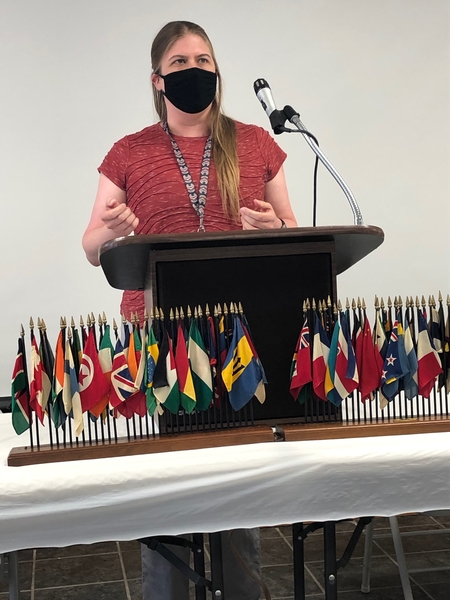
Kari Lane, an employee of the Egyptian Health Dept. for the past nine-and-a-half years, addressed the Carmi Kiwanis Club at the club’s weekly meeting on Thursday, July 9, 2020.
 Lane, who has a Bachelor’s Degree in Environmental Health and a Master’s in Public Service Administration, spoke about COVID-19. She said it first started showing up in the United States late last year at long term care facilities in Oregon and Washington. It has now reached 188 countries, including the U.S. About the only place it hasn’t spread to is Antarctica.
Lane, who has a Bachelor’s Degree in Environmental Health and a Master’s in Public Service Administration, spoke about COVID-19. She said it first started showing up in the United States late last year at long term care facilities in Oregon and Washington. It has now reached 188 countries, including the U.S. About the only place it hasn’t spread to is Antarctica.
“They are very well socially isolated there,” deadpanned Lane.
According to Lane, some of the symptoms of the virus include a fever of 100.4 or higher, cough, shortness of breath or fatigue, and in some cases, loss of the sense of smell or taste. The Centers for Disease Control also lists 16 additional factors, said Lane, who added, “You don’t really know what it is until you get tested.”
She said the disease is spread person to person and urged all to wear a mask in public.
“If I’m asymptomatic and I’m in a group of people without wearing a mask, and I’m standing within six feet of you, that’s the greatest risk of transferring it,” said Lane. She said staying six feet apart was important because “as you’re speaking, coughing or sneezing, that’s how far the droplets can travel. So the farther you are apart, there are more chances for those droplets to fall rather than falling toward your face or your hands.”
She added that cloth masks work well, as do surgical type masks, but added they prefer people use cloth masks so that the surgical masks can be saved for health professionals. At the time of the meeting, there had been eight confirmed cases of COVID-19 in White County.
Egyptian Health Dept. does not perform tests for COVID-19, but Lane added that two local hospitals, Christopher Rural Health and Ferrell Hospital, do offer those services. All test results from this area are sent to a lab in Carbondale.
Lane also explained the difference between being quarantined and self-isolating. To be quarantined, which would mean a person has come into contact with someone who has been diagnosed with COVID-19, means to stay home for 14 days, checking temperature and monitoring symptoms to see if any develop. Self-isolation is for someone who has tested positive and involves staying completely away from all others in his/her household. To be released from isolation, one has to have three days with no fever, the person’s symptoms must have improved and it must have been at least seven to 10 days since the person tested positive. She said a self-isolated person might be able to leave after seven days if their health was where it is supposed to be.
In response to a question from the audience, Lane said the Egyptian Health Dept. has been meeting with schools in the area and reviewing their re-opening plans to see if they match up with what the Illinois State Board of Education has put out and what the Illinois Dept. of Public Health has put out. They will be looking to fill holes and gaps to make sure that if schools get to open in the fall, that they get to do it safely.
Thanks to Toby Brown for providing this story!












